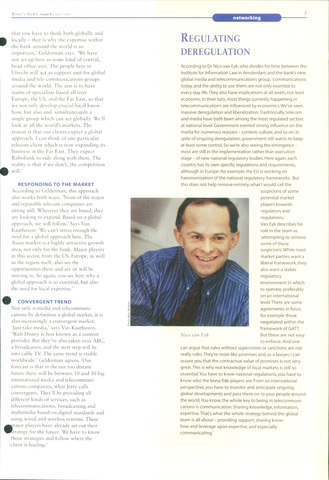Regulating
DEREGULATION
What's Nf.wS Issue 4. April 1996
networking
5
that you have to think both globally and
locally - that is why the expertise within
the bank around the world is so
important,' Gelderman says. 'We have
not set up here as some kind of central,
head office unit. The people here in
Utrecht will act as support unit for global
media and tele-communications groups
around the world. The aim is to have
teams of specialists based all over
Europe, the US, and the Far East, so that
we not only develop crucial local know
how, but also and simultaneously a
single group which can act globally. We'11
look at all the world's markets. The
reason is that our clients expect a global
approach. I can think of one particular
telecom cliënt which is now expanding its
business in the Far East. They expect
Rabobank to ride along with them. The
reality is that if we don't, the competition
RESPONDING TO THE MARKET
According to Gelderman, this approach
also works both ways. 'None of the major
and reputable telecom companies are
sitting still. Wherever they are based, they
are looking to expand. Based on a global
approach, we will follow.' Says Van
Kaathoven: 'We can't stress enough the
need for a global approach here. The
Asian market is a highly attractive growth
area, not only for the bank. Major players
in this sector, from the US, Europe, as well
as the region itself, also see the
opportunities there and are or will be
moving in. So again, you see here why a
global approach is so essential, but also
the need for local expertise.'
CONVERGENTTREND
Not only is media and telecommuni-
cations by definition a global market, it is
also increasingly a convergent market.
'Just take media,' says Van Kaathoven.
'Walt Disney is best known as a content
provider. But they've also taken over ABC,
a broadcaster, and the next step will be
into cable TV. The same trend is visible
worldwide.' Gelderman agrees. 'Our
forecast is that in the not too distant
future there will be between 10 and 30 big
international media and telecommuni-
cations companies, what Jerry calls
convergents. They'll be providing all
different kinds of services, such as
telecommunications, broadcasting and
multimedia based on digital standards and
using wired and wireless systems. These
imajor players have already set out their
"trategy for the future. We have to know
those strategies and follow where the
cliënt is leading.'
According to Dr Nico van Eyk, who divides his time between the
Institutefor Information Law in Amsterdam and the bank's new
global media and telecommunications group, 'Communications
today, and the ability to use them, are not only essential to
every-day life.They also have implications at all levels, not least
economie. In their turn, most things currently happening in
telecommunications are influenced by economics. We've seen
massive deregulation and liberalization.Traditionally, telecom
and media have both been among the most regulated sectors
at national level.Government exerted strong influence on the
media for numerous reasons - content, culture, and so on. In
spite of ongoing deregulation, government still wants to keep
at least some control. So we're also seeing the emergence -
most are still in the implementation rather than execution
stage - of new national regulatory bodies. Here again, each
country has its own specific regulations and requirements,
although in Europe,for example, the EU is working on
haromonization of the national regulatory frameworks. But
this does not help remove entirely what I would call the
suspicions of some
potential market
players towards
regulators and
regulations.'
Van Eyk describes his
role in the team as
'attempting to remove
some of these
suspicions'.While most
market parties want a
liberal framework,they
also want a stable
regulatory
environment in which
to operate, preferably
on an international
level.There are some
agreements in force,
for example those
negotiated within the
framework of GATT.
Nico van Eyk But these are not easy
to enforce. And one
can argue that rules without supervision or sanctions are not
really rules.They're more like promises and, as a lawyer,l can
assure you that the contractual value of promises is not very
great.This is why real knowledge of local markets is still so
essential. You have to know national regulations,you have to
know who the bona fide players are. From an international
perspective, you have to monitor and anticipate ongoing
global developments and pass them on to your people around
the world. You know, the whole key to being in telecommuni
cations is communication. Sharing knowledge, information,
expertise.That's what the whole strategy behind the global
team is all about - providing support, sharing know
how and leverage upon expertise, and especially
communicating.'

